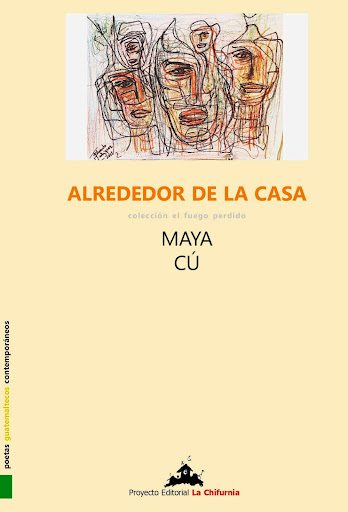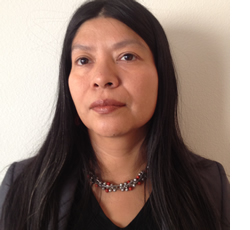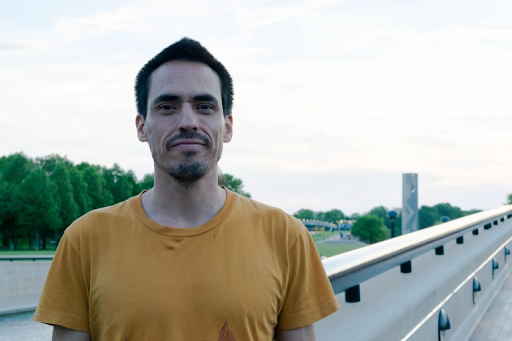Original poetry in Spanish from Alrededor de la casa © Maya Cú
Introduction, selection and translation by Gloria E. Chacón and Juan G. Sánchez Martínez
If you prefer to read the PDF, click HERE
Kaqchikel researcher Aura Estela Cumes explains that paternalistic culturalism in Guatemala represents the Mayan woman as a tourist object, a museum piece, a weaver and guardian of culture, but at the same time separates her from the possibility of being an “epistemic authority.” Maya Cú captures this sexist paternalism in the following verses:
(...) to be clear: I am not an ancestral clay doll revived by divine breath of postmodern intellectuals.
Since 1996, Maya Cú has been reminding Guatemalan—and by extension Latin American— society how scared they are to look in the mirror and discover how brown, how cinnamon, how mixed they are, how “beautifully brown” [they are] (“Rabia / Rage”.) In her essay “Poetas y escritoras mayas de Guatemala: Del silencio a la palabra” (“Mayan Women Poets and Writers from Guatemala: From Silence to Word”) (2016), Cú questions the censorship of colonial institutions (school, family, church) of Indigenous women voices, but also interrogates the self-censorship of Indigenous women. In some cases, Indigenous women do not recognize themselves as writers (84). In Cú’s words, the expectations of editors and academics about Indigeneity (as a rural and ethnic problem) preclude them from recognizing the diversity of contemporary Mayan expressions. The poems that we publish here are a sample of Maya Cu’s latest book, Alredor de la casa (“Around the house”) (La Chifurnia, 2022).
It was never more than a shelter from the outdoors it had fragile walls humidity there we cohabited rats trash my sisters me it was the house it is the house root of a human group and that woman a column who refuses to let it fall
An aseismic house must have a strong foundation a deep iron frame when the earthquake comes, the house will hardly fall What if this tenant does not have a good foundation?
Wooden walls vulnerabile before fire aluminum walls avert rain but lock the heat in cement ceilings and walls protect from rain, sun, fire how to avoid loneliness? how does one defend oneself from sadness? how to build kick-proof walls? who designs houses that shelter, feed, protect and provide endless doses of understanding and tenderness?
For those in the room. Managua, 2002
We live together we recreate love we strip our skins we listen to each other we fight we laugh, we play we were girls we cry we were the women from that room killing borders creating a new house from which we didn't want to leave a refuge with sisters and mothers in a constant coven giving us freedom
There is a lot to do a lot to do first we will rearrange space the cardinal points will be oriented in the direction of heaven the moon will be full for a long time the rainy cloud will come at night to sleep on the terrace where will we put the fog? the balcony that is on its way will gladly share its flower you will have an infinite wall to set up your wildest exhibition for me I just want the corner from where I will see you my love assembling and disarming the world
Where can a young heart go, wounded by distance, melancholy, disdain, if the house is half built? If the walls are fragile and the floor is damp? Seeking refuge without finding it. Leaves running naked, to shelter in other hungry hearts for company.
I aged inside left pieces of me scattered throughout walls I moved by inertia I left seeds in some eyes hugs in some bodies I left almost empty now I carry wrinkles white hair nostalgia, pain I pick up my pieces I put them in a bag and I go out and I can't find anything but sadness...
I dreamed of a house White surrounded by flowers and tall trees I only asked for a deserved roof and floor I never had it Yesterday a provider of certainty appeared He daily builds next to me this new house in mutual discovery we are laying the foundations we make the walls we share the dream to put our pieces together to build a new house where we will live
Today I undressed I posed for the camera the room strewn with clothes throughout my footprints scattered when I stopped I realized that all the mirrors disappeared I found my body dancing smiling friendly and passionate and it was enough for me
She knows that upon her return she will open the door and feel joy to meet you for coffee for dipping bread in coffee to the listen to the radio and dance to the beat of your song He knows that upon his return he will remove the wire from the gate cross the patio to reach your side he will greet you happily because he managed to finish a day’s work because the earth responds to his care the sun was benevolent and did not burn his skin the rain is generous and will fall later he will show you the best seeds that he found for the next sowing they will eat next to the stone-bench beans and hot coffee corn tortillas from their harvest and cheese melted like them
Elena visits the house
I
Strange communion with Elena
Did you hear my name? You looked for it and you preferred it, because you know that here, behind this nomenclature, my soul is waiting for a reunion celebration. But, the only celebration we put up today is one of tears. Time and time again, the weeping, why unites our hearts like this? Is our sorrow for these beloved cities so great that it is capable of uniting our distant melancholies?
II
girls reunion
Painting that afternoon would be fun if Elena was calm enough to pose. But Elena is a restless girl who bites her nails and spits the waste on the chair. She wets her feet in the firm sand of a sea that cannot be crossed. A sea that erased the way back to the city of our daydream, our dream, our ephemeral root, our space of communion. I, the little sister, watch her carefully, while I wait for time to stop on this piece of beach, asking Yemayá to take care of us, to be our mother, our goddess, our friend, our compass, to return to that city.
III
The one I’m not
Diva elegance in the word voice and erudition corporeal strength unattainable height charismatic presence a story that I would like as my own feet dancing on the urban cobbled street sand full of your feet water full of your fear lips reciting verses next to Reynaldo eyes alive of revolution flashing fingers mestizo song eternal song cheerful song song with tone song with you your song my song Song not yet written half song song without score broken song shared song song in two rhythms distant song oppressive uncertain sad song without reason sad permanent weep never ending pain intimate pain pain countering parallel pain the one you are not the one we are
IV
Epilogue
If I ever belonged to someone it's to you because you chose me or because my shadowy female ancestor chose you
Image
Grandma whisks cocoa gathers the fire secures the ocote-sticks the girl braids garlic draws a circle, and skeletons rise dancing at its center inviting to swing a song of few notes I dance the mist fills with colors I rise the image is immortalized behind the door
More about Maya Cú
- Maya Cú’s anthology in the project Mayan Women, The Mayan Among Us.
The Translators
Gloria E. Chacón is Associate Professor in the Literature Department at UCSD. Both her research and teaching focus on indigenous literatures, autonomy, and philosophy. She is the author of Indigenous Cosmolectics: Kab’awil and the Making of Maya and Zapotec Literatures (2018). She is currently working on her second book tentatively titled Metamestizaje, Indigeneity, and Diasporas: Challenging Cartographies. She is co-editor of Indigenous Interfaces: Spaces, Technology, and Social Networks in Mexico and Central America by Arizona Press(2019). She is also co-editing an anthology Teaching Central American Literature in a Global Context for MLA’s Teaching Options Series. Chacón’s work has appeared in anthologies and journals in Canada, Colombia, Germany, Mexico, and the USA. She has co-edited a special issue on indigenous literature for DePaul University. .\
Juan G. Sánchez Martínez, grew up in Bakatá, Colombian Andes. He dedicates both his creative and scholarly writing to indigenous cultural expressions from Abiayala (the Americas.) His book of poetry, Altamar, was awarded in 2016 with the National Prize Universidad de Antioquia, Colombia. He collaborates and translates for Siwar Mayu, A River of Hummingbirds. Recent works: Muyurina y el presente profundo (Pakarina/Hawansuyo, 2019); and Cinema, Literature and Art Against Extractivism in Latin America. Dialogo 22.1 (DePaul University, 2019.) He is currently an associate professor at the University of North Carolina Asheville, in the Departments of Languages and Literatures, and of American Indian and Indigenous Studies.
Alrededor de la casa © Maya Cú ~ Siwar Mayu, April 2022 Introduction, selection and translation © Gloria E. Chacón and Juan G. Sánchez M.




